A Report on the Yorta Yorta Case and Indigenous Policy in Australia
VerifiedAdded on 2022/10/11
|8
|2013
|14
Report
AI Summary
This report analyzes the Yorta Yorta v Victoria (2002) case, focusing on its implications for Indigenous policy in Australia. It examines the concept of native title, its historical context, and the legal framework established by the Native Title Act (Cth) 1993. The report discusses the Federal Court and High Court decisions, particularly the clarification of evidence required to prove native title, emphasizing the importance of traditional laws and customs. It critiques the changes in policy following the Yorta Yorta case, highlighting the challenges faced by Indigenous claimants. The report analyzes the normative systems used by judges and their impact on Indigenous rights, concluding that the case has significantly altered the landscape of native title claims. It provides a summary of the case and its broader impact on Australian Indigenous policy.
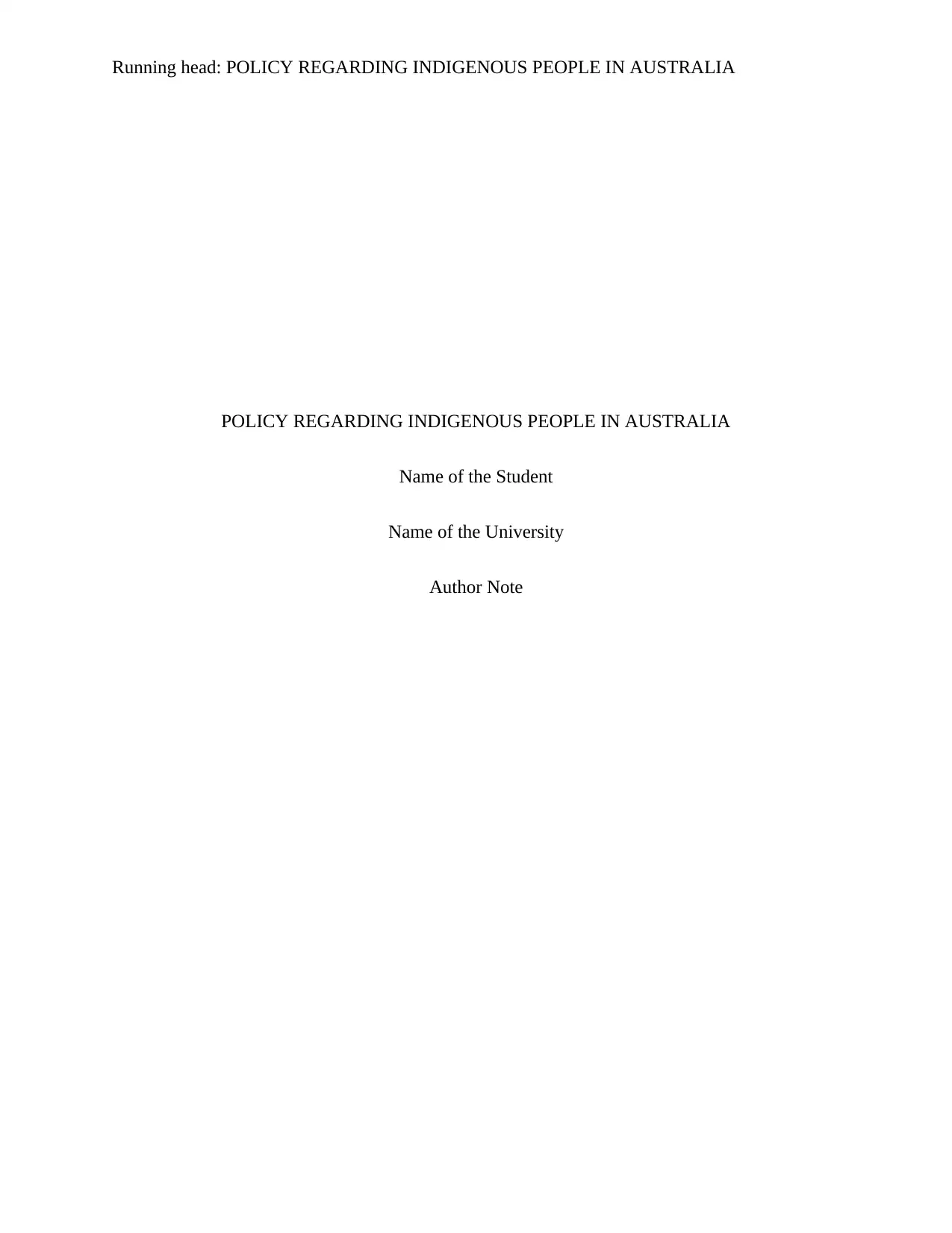
Running head: POLICY REGARDING INDIGENOUS PEOPLE IN AUSTRALIA
POLICY REGARDING INDIGENOUS PEOPLE IN AUSTRALIA
Name of the Student
Name of the University
Author Note
POLICY REGARDING INDIGENOUS PEOPLE IN AUSTRALIA
Name of the Student
Name of the University
Author Note
Paraphrase This Document
Need a fresh take? Get an instant paraphrase of this document with our AI Paraphraser
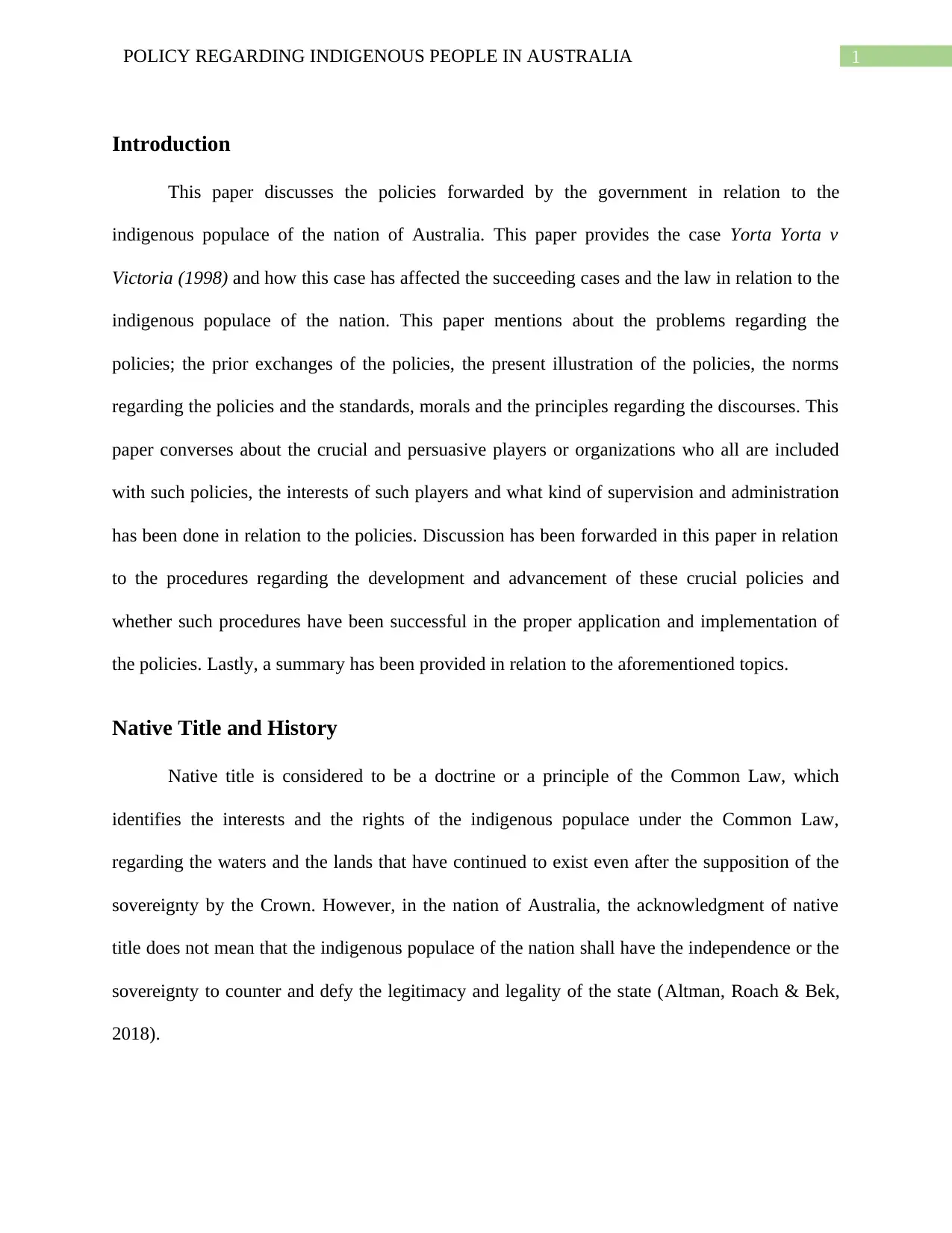
1POLICY REGARDING INDIGENOUS PEOPLE IN AUSTRALIA
Introduction
This paper discusses the policies forwarded by the government in relation to the
indigenous populace of the nation of Australia. This paper provides the case Yorta Yorta v
Victoria (1998) and how this case has affected the succeeding cases and the law in relation to the
indigenous populace of the nation. This paper mentions about the problems regarding the
policies; the prior exchanges of the policies, the present illustration of the policies, the norms
regarding the policies and the standards, morals and the principles regarding the discourses. This
paper converses about the crucial and persuasive players or organizations who all are included
with such policies, the interests of such players and what kind of supervision and administration
has been done in relation to the policies. Discussion has been forwarded in this paper in relation
to the procedures regarding the development and advancement of these crucial policies and
whether such procedures have been successful in the proper application and implementation of
the policies. Lastly, a summary has been provided in relation to the aforementioned topics.
Native Title and History
Native title is considered to be a doctrine or a principle of the Common Law, which
identifies the interests and the rights of the indigenous populace under the Common Law,
regarding the waters and the lands that have continued to exist even after the supposition of the
sovereignty by the Crown. However, in the nation of Australia, the acknowledgment of native
title does not mean that the indigenous populace of the nation shall have the independence or the
sovereignty to counter and defy the legitimacy and legality of the state (Altman, Roach & Bek,
2018).
Introduction
This paper discusses the policies forwarded by the government in relation to the
indigenous populace of the nation of Australia. This paper provides the case Yorta Yorta v
Victoria (1998) and how this case has affected the succeeding cases and the law in relation to the
indigenous populace of the nation. This paper mentions about the problems regarding the
policies; the prior exchanges of the policies, the present illustration of the policies, the norms
regarding the policies and the standards, morals and the principles regarding the discourses. This
paper converses about the crucial and persuasive players or organizations who all are included
with such policies, the interests of such players and what kind of supervision and administration
has been done in relation to the policies. Discussion has been forwarded in this paper in relation
to the procedures regarding the development and advancement of these crucial policies and
whether such procedures have been successful in the proper application and implementation of
the policies. Lastly, a summary has been provided in relation to the aforementioned topics.
Native Title and History
Native title is considered to be a doctrine or a principle of the Common Law, which
identifies the interests and the rights of the indigenous populace under the Common Law,
regarding the waters and the lands that have continued to exist even after the supposition of the
sovereignty by the Crown. However, in the nation of Australia, the acknowledgment of native
title does not mean that the indigenous populace of the nation shall have the independence or the
sovereignty to counter and defy the legitimacy and legality of the state (Altman, Roach & Bek,
2018).
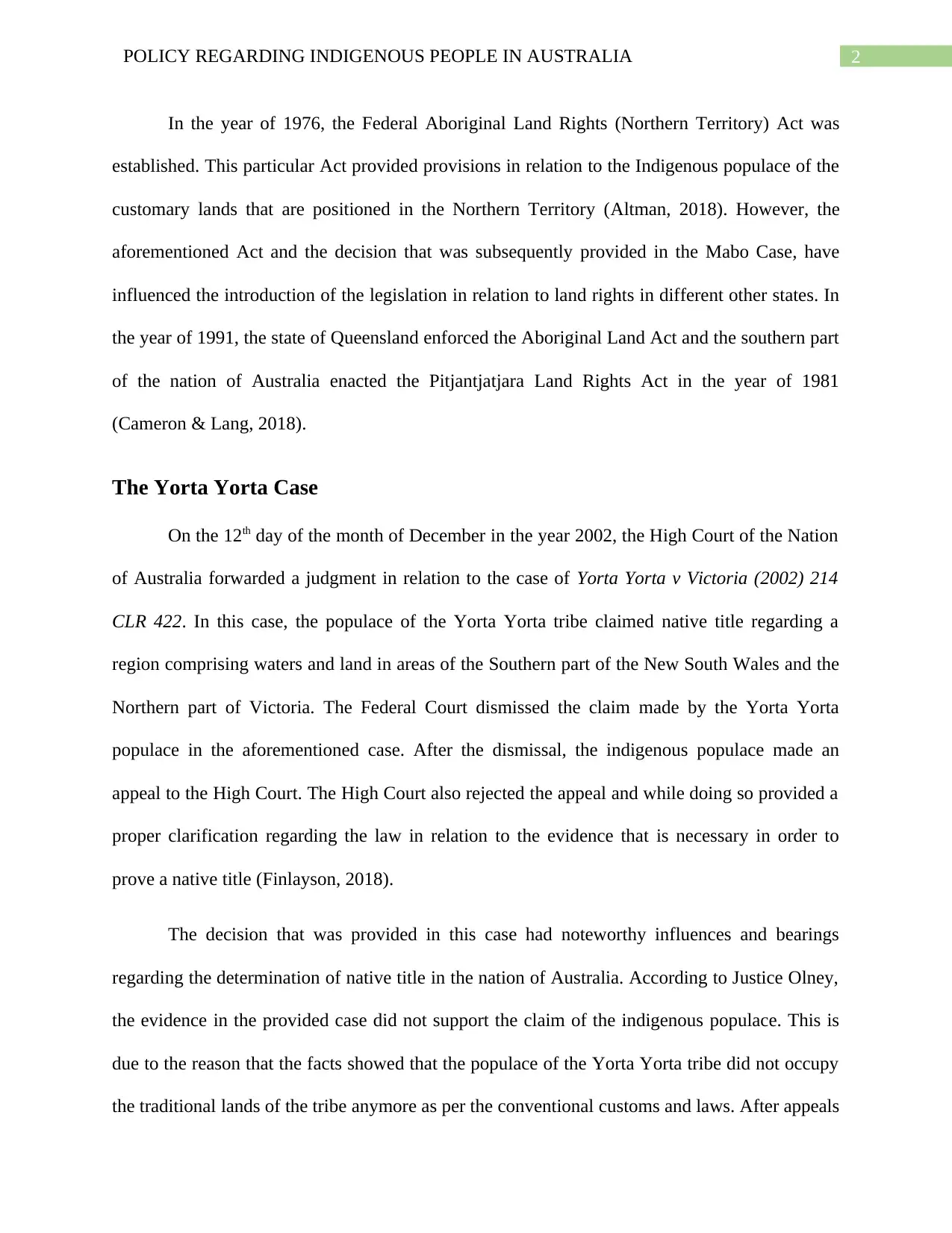
2POLICY REGARDING INDIGENOUS PEOPLE IN AUSTRALIA
In the year of 1976, the Federal Aboriginal Land Rights (Northern Territory) Act was
established. This particular Act provided provisions in relation to the Indigenous populace of the
customary lands that are positioned in the Northern Territory (Altman, 2018). However, the
aforementioned Act and the decision that was subsequently provided in the Mabo Case, have
influenced the introduction of the legislation in relation to land rights in different other states. In
the year of 1991, the state of Queensland enforced the Aboriginal Land Act and the southern part
of the nation of Australia enacted the Pitjantjatjara Land Rights Act in the year of 1981
(Cameron & Lang, 2018).
The Yorta Yorta Case
On the 12th day of the month of December in the year 2002, the High Court of the Nation
of Australia forwarded a judgment in relation to the case of Yorta Yorta v Victoria (2002) 214
CLR 422. In this case, the populace of the Yorta Yorta tribe claimed native title regarding a
region comprising waters and land in areas of the Southern part of the New South Wales and the
Northern part of Victoria. The Federal Court dismissed the claim made by the Yorta Yorta
populace in the aforementioned case. After the dismissal, the indigenous populace made an
appeal to the High Court. The High Court also rejected the appeal and while doing so provided a
proper clarification regarding the law in relation to the evidence that is necessary in order to
prove a native title (Finlayson, 2018).
The decision that was provided in this case had noteworthy influences and bearings
regarding the determination of native title in the nation of Australia. According to Justice Olney,
the evidence in the provided case did not support the claim of the indigenous populace. This is
due to the reason that the facts showed that the populace of the Yorta Yorta tribe did not occupy
the traditional lands of the tribe anymore as per the conventional customs and laws. After appeals
In the year of 1976, the Federal Aboriginal Land Rights (Northern Territory) Act was
established. This particular Act provided provisions in relation to the Indigenous populace of the
customary lands that are positioned in the Northern Territory (Altman, 2018). However, the
aforementioned Act and the decision that was subsequently provided in the Mabo Case, have
influenced the introduction of the legislation in relation to land rights in different other states. In
the year of 1991, the state of Queensland enforced the Aboriginal Land Act and the southern part
of the nation of Australia enacted the Pitjantjatjara Land Rights Act in the year of 1981
(Cameron & Lang, 2018).
The Yorta Yorta Case
On the 12th day of the month of December in the year 2002, the High Court of the Nation
of Australia forwarded a judgment in relation to the case of Yorta Yorta v Victoria (2002) 214
CLR 422. In this case, the populace of the Yorta Yorta tribe claimed native title regarding a
region comprising waters and land in areas of the Southern part of the New South Wales and the
Northern part of Victoria. The Federal Court dismissed the claim made by the Yorta Yorta
populace in the aforementioned case. After the dismissal, the indigenous populace made an
appeal to the High Court. The High Court also rejected the appeal and while doing so provided a
proper clarification regarding the law in relation to the evidence that is necessary in order to
prove a native title (Finlayson, 2018).
The decision that was provided in this case had noteworthy influences and bearings
regarding the determination of native title in the nation of Australia. According to Justice Olney,
the evidence in the provided case did not support the claim of the indigenous populace. This is
due to the reason that the facts showed that the populace of the Yorta Yorta tribe did not occupy
the traditional lands of the tribe anymore as per the conventional customs and laws. After appeals
⊘ This is a preview!⊘
Do you want full access?
Subscribe today to unlock all pages.

Trusted by 1+ million students worldwide
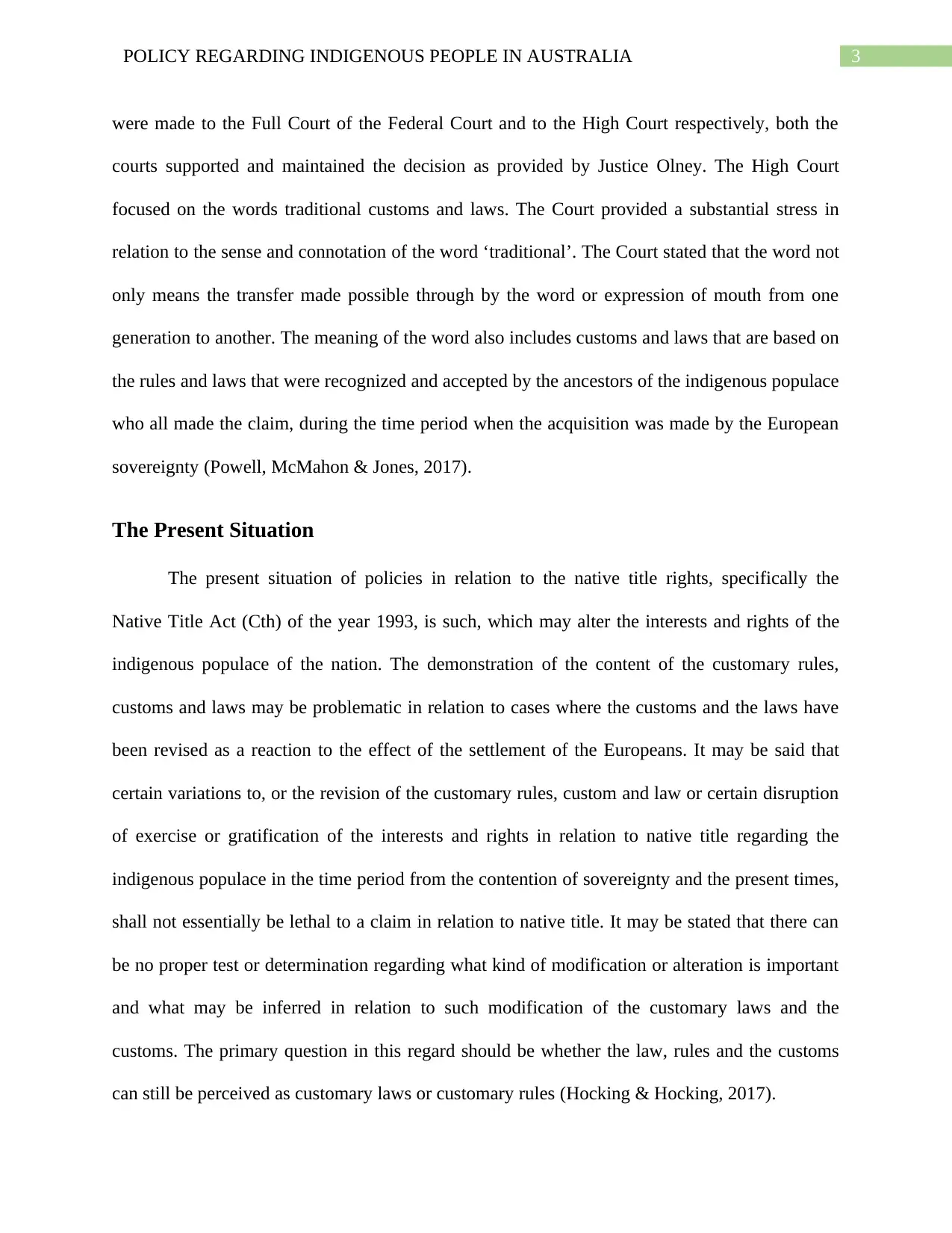
3POLICY REGARDING INDIGENOUS PEOPLE IN AUSTRALIA
were made to the Full Court of the Federal Court and to the High Court respectively, both the
courts supported and maintained the decision as provided by Justice Olney. The High Court
focused on the words traditional customs and laws. The Court provided a substantial stress in
relation to the sense and connotation of the word ‘traditional’. The Court stated that the word not
only means the transfer made possible through by the word or expression of mouth from one
generation to another. The meaning of the word also includes customs and laws that are based on
the rules and laws that were recognized and accepted by the ancestors of the indigenous populace
who all made the claim, during the time period when the acquisition was made by the European
sovereignty (Powell, McMahon & Jones, 2017).
The Present Situation
The present situation of policies in relation to the native title rights, specifically the
Native Title Act (Cth) of the year 1993, is such, which may alter the interests and rights of the
indigenous populace of the nation. The demonstration of the content of the customary rules,
customs and laws may be problematic in relation to cases where the customs and the laws have
been revised as a reaction to the effect of the settlement of the Europeans. It may be said that
certain variations to, or the revision of the customary rules, custom and law or certain disruption
of exercise or gratification of the interests and rights in relation to native title regarding the
indigenous populace in the time period from the contention of sovereignty and the present times,
shall not essentially be lethal to a claim in relation to native title. It may be stated that there can
be no proper test or determination regarding what kind of modification or alteration is important
and what may be inferred in relation to such modification of the customary laws and the
customs. The primary question in this regard should be whether the law, rules and the customs
can still be perceived as customary laws or customary rules (Hocking & Hocking, 2017).
were made to the Full Court of the Federal Court and to the High Court respectively, both the
courts supported and maintained the decision as provided by Justice Olney. The High Court
focused on the words traditional customs and laws. The Court provided a substantial stress in
relation to the sense and connotation of the word ‘traditional’. The Court stated that the word not
only means the transfer made possible through by the word or expression of mouth from one
generation to another. The meaning of the word also includes customs and laws that are based on
the rules and laws that were recognized and accepted by the ancestors of the indigenous populace
who all made the claim, during the time period when the acquisition was made by the European
sovereignty (Powell, McMahon & Jones, 2017).
The Present Situation
The present situation of policies in relation to the native title rights, specifically the
Native Title Act (Cth) of the year 1993, is such, which may alter the interests and rights of the
indigenous populace of the nation. The demonstration of the content of the customary rules,
customs and laws may be problematic in relation to cases where the customs and the laws have
been revised as a reaction to the effect of the settlement of the Europeans. It may be said that
certain variations to, or the revision of the customary rules, custom and law or certain disruption
of exercise or gratification of the interests and rights in relation to native title regarding the
indigenous populace in the time period from the contention of sovereignty and the present times,
shall not essentially be lethal to a claim in relation to native title. It may be stated that there can
be no proper test or determination regarding what kind of modification or alteration is important
and what may be inferred in relation to such modification of the customary laws and the
customs. The primary question in this regard should be whether the law, rules and the customs
can still be perceived as customary laws or customary rules (Hocking & Hocking, 2017).
Paraphrase This Document
Need a fresh take? Get an instant paraphrase of this document with our AI Paraphraser
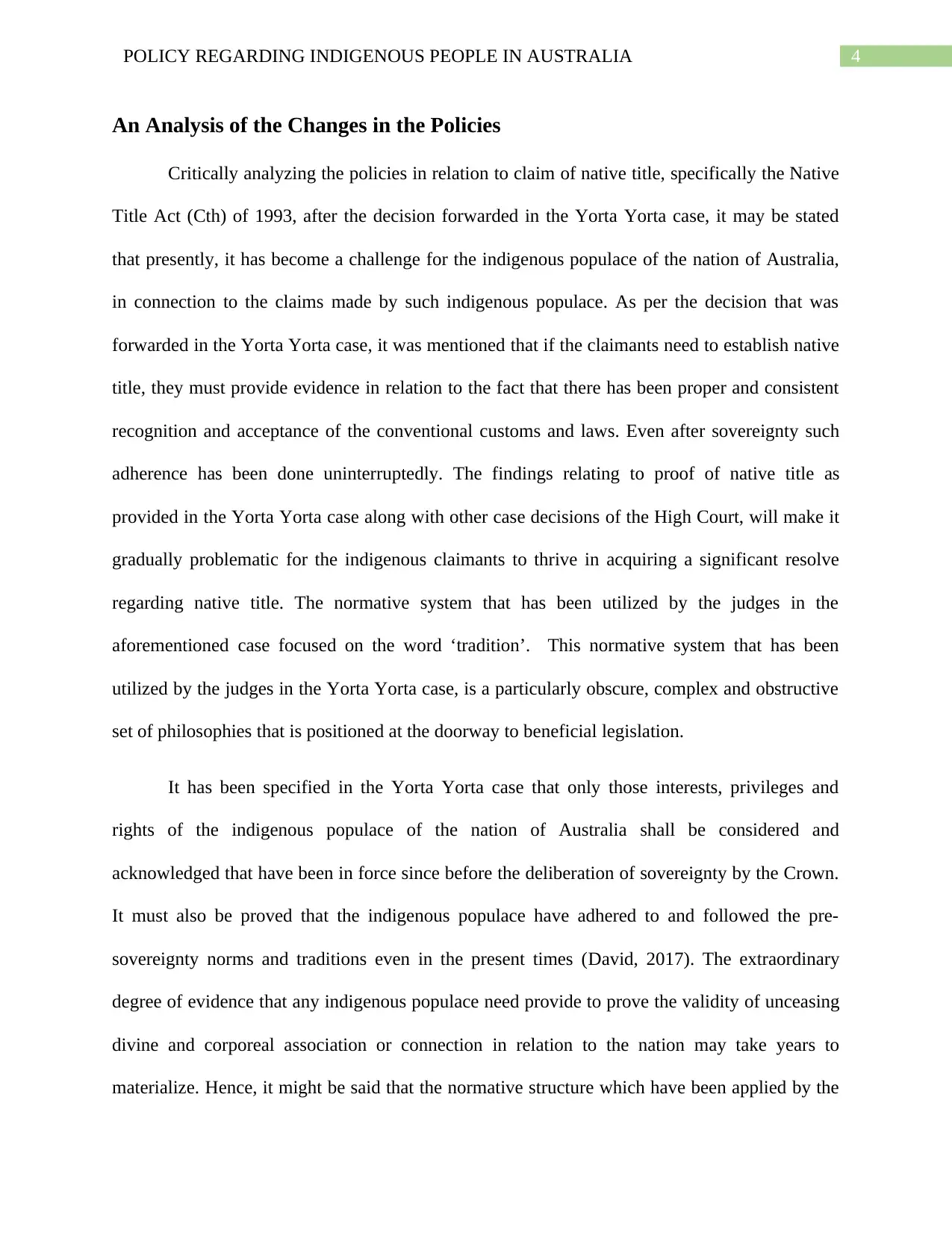
4POLICY REGARDING INDIGENOUS PEOPLE IN AUSTRALIA
An Analysis of the Changes in the Policies
Critically analyzing the policies in relation to claim of native title, specifically the Native
Title Act (Cth) of 1993, after the decision forwarded in the Yorta Yorta case, it may be stated
that presently, it has become a challenge for the indigenous populace of the nation of Australia,
in connection to the claims made by such indigenous populace. As per the decision that was
forwarded in the Yorta Yorta case, it was mentioned that if the claimants need to establish native
title, they must provide evidence in relation to the fact that there has been proper and consistent
recognition and acceptance of the conventional customs and laws. Even after sovereignty such
adherence has been done uninterruptedly. The findings relating to proof of native title as
provided in the Yorta Yorta case along with other case decisions of the High Court, will make it
gradually problematic for the indigenous claimants to thrive in acquiring a significant resolve
regarding native title. The normative system that has been utilized by the judges in the
aforementioned case focused on the word ‘tradition’. This normative system that has been
utilized by the judges in the Yorta Yorta case, is a particularly obscure, complex and obstructive
set of philosophies that is positioned at the doorway to beneficial legislation.
It has been specified in the Yorta Yorta case that only those interests, privileges and
rights of the indigenous populace of the nation of Australia shall be considered and
acknowledged that have been in force since before the deliberation of sovereignty by the Crown.
It must also be proved that the indigenous populace have adhered to and followed the pre-
sovereignty norms and traditions even in the present times (David, 2017). The extraordinary
degree of evidence that any indigenous populace need provide to prove the validity of unceasing
divine and corporeal association or connection in relation to the nation may take years to
materialize. Hence, it might be said that the normative structure which have been applied by the
An Analysis of the Changes in the Policies
Critically analyzing the policies in relation to claim of native title, specifically the Native
Title Act (Cth) of 1993, after the decision forwarded in the Yorta Yorta case, it may be stated
that presently, it has become a challenge for the indigenous populace of the nation of Australia,
in connection to the claims made by such indigenous populace. As per the decision that was
forwarded in the Yorta Yorta case, it was mentioned that if the claimants need to establish native
title, they must provide evidence in relation to the fact that there has been proper and consistent
recognition and acceptance of the conventional customs and laws. Even after sovereignty such
adherence has been done uninterruptedly. The findings relating to proof of native title as
provided in the Yorta Yorta case along with other case decisions of the High Court, will make it
gradually problematic for the indigenous claimants to thrive in acquiring a significant resolve
regarding native title. The normative system that has been utilized by the judges in the
aforementioned case focused on the word ‘tradition’. This normative system that has been
utilized by the judges in the Yorta Yorta case, is a particularly obscure, complex and obstructive
set of philosophies that is positioned at the doorway to beneficial legislation.
It has been specified in the Yorta Yorta case that only those interests, privileges and
rights of the indigenous populace of the nation of Australia shall be considered and
acknowledged that have been in force since before the deliberation of sovereignty by the Crown.
It must also be proved that the indigenous populace have adhered to and followed the pre-
sovereignty norms and traditions even in the present times (David, 2017). The extraordinary
degree of evidence that any indigenous populace need provide to prove the validity of unceasing
divine and corporeal association or connection in relation to the nation may take years to
materialize. Hence, it might be said that the normative structure which have been applied by the
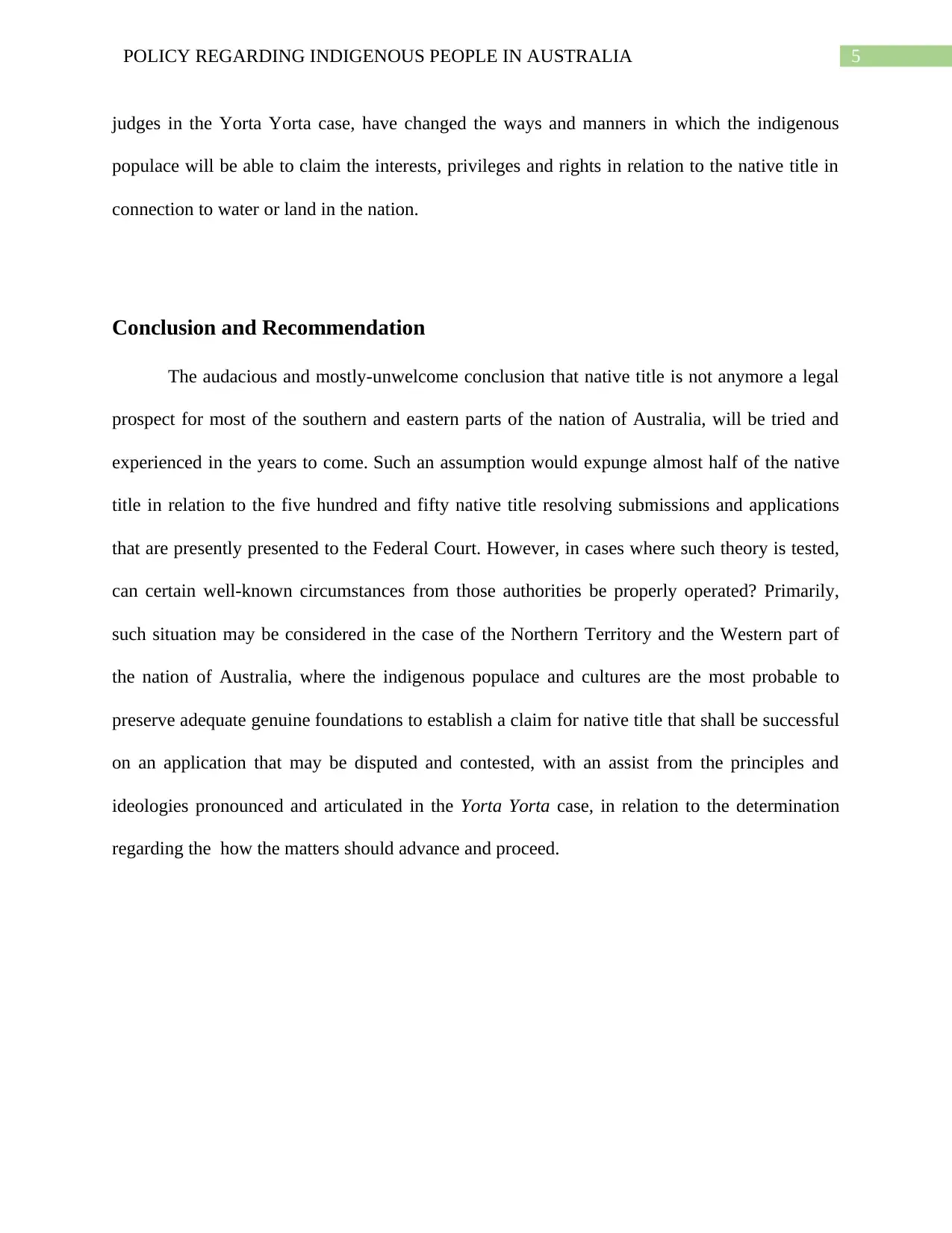
5POLICY REGARDING INDIGENOUS PEOPLE IN AUSTRALIA
judges in the Yorta Yorta case, have changed the ways and manners in which the indigenous
populace will be able to claim the interests, privileges and rights in relation to the native title in
connection to water or land in the nation.
Conclusion and Recommendation
The audacious and mostly-unwelcome conclusion that native title is not anymore a legal
prospect for most of the southern and eastern parts of the nation of Australia, will be tried and
experienced in the years to come. Such an assumption would expunge almost half of the native
title in relation to the five hundred and fifty native title resolving submissions and applications
that are presently presented to the Federal Court. However, in cases where such theory is tested,
can certain well-known circumstances from those authorities be properly operated? Primarily,
such situation may be considered in the case of the Northern Territory and the Western part of
the nation of Australia, where the indigenous populace and cultures are the most probable to
preserve adequate genuine foundations to establish a claim for native title that shall be successful
on an application that may be disputed and contested, with an assist from the principles and
ideologies pronounced and articulated in the Yorta Yorta case, in relation to the determination
regarding the how the matters should advance and proceed.
judges in the Yorta Yorta case, have changed the ways and manners in which the indigenous
populace will be able to claim the interests, privileges and rights in relation to the native title in
connection to water or land in the nation.
Conclusion and Recommendation
The audacious and mostly-unwelcome conclusion that native title is not anymore a legal
prospect for most of the southern and eastern parts of the nation of Australia, will be tried and
experienced in the years to come. Such an assumption would expunge almost half of the native
title in relation to the five hundred and fifty native title resolving submissions and applications
that are presently presented to the Federal Court. However, in cases where such theory is tested,
can certain well-known circumstances from those authorities be properly operated? Primarily,
such situation may be considered in the case of the Northern Territory and the Western part of
the nation of Australia, where the indigenous populace and cultures are the most probable to
preserve adequate genuine foundations to establish a claim for native title that shall be successful
on an application that may be disputed and contested, with an assist from the principles and
ideologies pronounced and articulated in the Yorta Yorta case, in relation to the determination
regarding the how the matters should advance and proceed.
⊘ This is a preview!⊘
Do you want full access?
Subscribe today to unlock all pages.

Trusted by 1+ million students worldwide
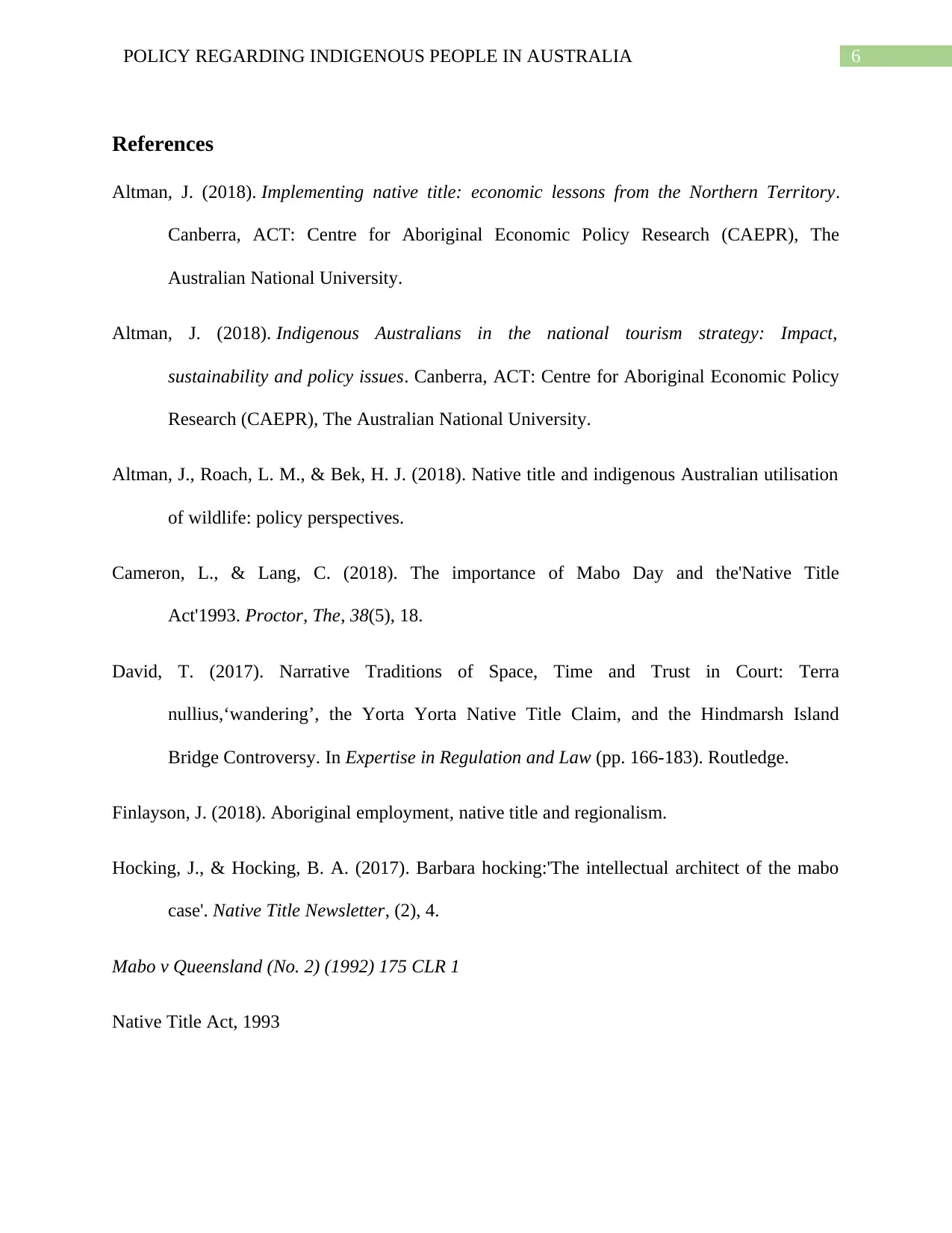
6POLICY REGARDING INDIGENOUS PEOPLE IN AUSTRALIA
References
Altman, J. (2018). Implementing native title: economic lessons from the Northern Territory.
Canberra, ACT: Centre for Aboriginal Economic Policy Research (CAEPR), The
Australian National University.
Altman, J. (2018). Indigenous Australians in the national tourism strategy: Impact,
sustainability and policy issues. Canberra, ACT: Centre for Aboriginal Economic Policy
Research (CAEPR), The Australian National University.
Altman, J., Roach, L. M., & Bek, H. J. (2018). Native title and indigenous Australian utilisation
of wildlife: policy perspectives.
Cameron, L., & Lang, C. (2018). The importance of Mabo Day and the'Native Title
Act'1993. Proctor, The, 38(5), 18.
David, T. (2017). Narrative Traditions of Space, Time and Trust in Court: Terra
nullius,‘wandering’, the Yorta Yorta Native Title Claim, and the Hindmarsh Island
Bridge Controversy. In Expertise in Regulation and Law (pp. 166-183). Routledge.
Finlayson, J. (2018). Aboriginal employment, native title and regionalism.
Hocking, J., & Hocking, B. A. (2017). Barbara hocking:'The intellectual architect of the mabo
case'. Native Title Newsletter, (2), 4.
Mabo v Queensland (No. 2) (1992) 175 CLR 1
Native Title Act, 1993
References
Altman, J. (2018). Implementing native title: economic lessons from the Northern Territory.
Canberra, ACT: Centre for Aboriginal Economic Policy Research (CAEPR), The
Australian National University.
Altman, J. (2018). Indigenous Australians in the national tourism strategy: Impact,
sustainability and policy issues. Canberra, ACT: Centre for Aboriginal Economic Policy
Research (CAEPR), The Australian National University.
Altman, J., Roach, L. M., & Bek, H. J. (2018). Native title and indigenous Australian utilisation
of wildlife: policy perspectives.
Cameron, L., & Lang, C. (2018). The importance of Mabo Day and the'Native Title
Act'1993. Proctor, The, 38(5), 18.
David, T. (2017). Narrative Traditions of Space, Time and Trust in Court: Terra
nullius,‘wandering’, the Yorta Yorta Native Title Claim, and the Hindmarsh Island
Bridge Controversy. In Expertise in Regulation and Law (pp. 166-183). Routledge.
Finlayson, J. (2018). Aboriginal employment, native title and regionalism.
Hocking, J., & Hocking, B. A. (2017). Barbara hocking:'The intellectual architect of the mabo
case'. Native Title Newsletter, (2), 4.
Mabo v Queensland (No. 2) (1992) 175 CLR 1
Native Title Act, 1993
Paraphrase This Document
Need a fresh take? Get an instant paraphrase of this document with our AI Paraphraser
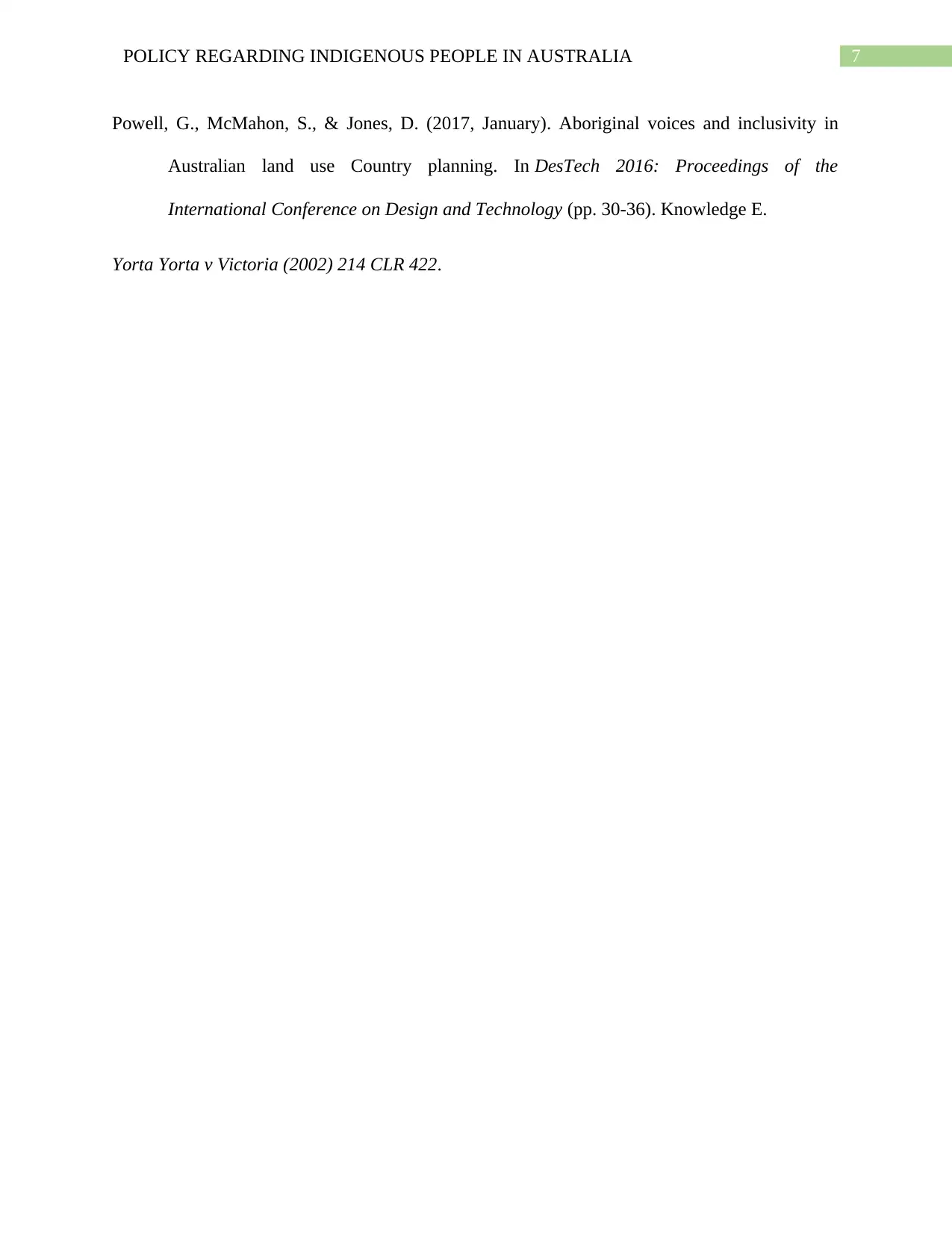
7POLICY REGARDING INDIGENOUS PEOPLE IN AUSTRALIA
Powell, G., McMahon, S., & Jones, D. (2017, January). Aboriginal voices and inclusivity in
Australian land use Country planning. In DesTech 2016: Proceedings of the
International Conference on Design and Technology (pp. 30-36). Knowledge E.
Yorta Yorta v Victoria (2002) 214 CLR 422.
Powell, G., McMahon, S., & Jones, D. (2017, January). Aboriginal voices and inclusivity in
Australian land use Country planning. In DesTech 2016: Proceedings of the
International Conference on Design and Technology (pp. 30-36). Knowledge E.
Yorta Yorta v Victoria (2002) 214 CLR 422.
1 out of 8
Related Documents
Your All-in-One AI-Powered Toolkit for Academic Success.
+13062052269
info@desklib.com
Available 24*7 on WhatsApp / Email
![[object Object]](/_next/static/media/star-bottom.7253800d.svg)
Unlock your academic potential
Copyright © 2020–2025 A2Z Services. All Rights Reserved. Developed and managed by ZUCOL.




